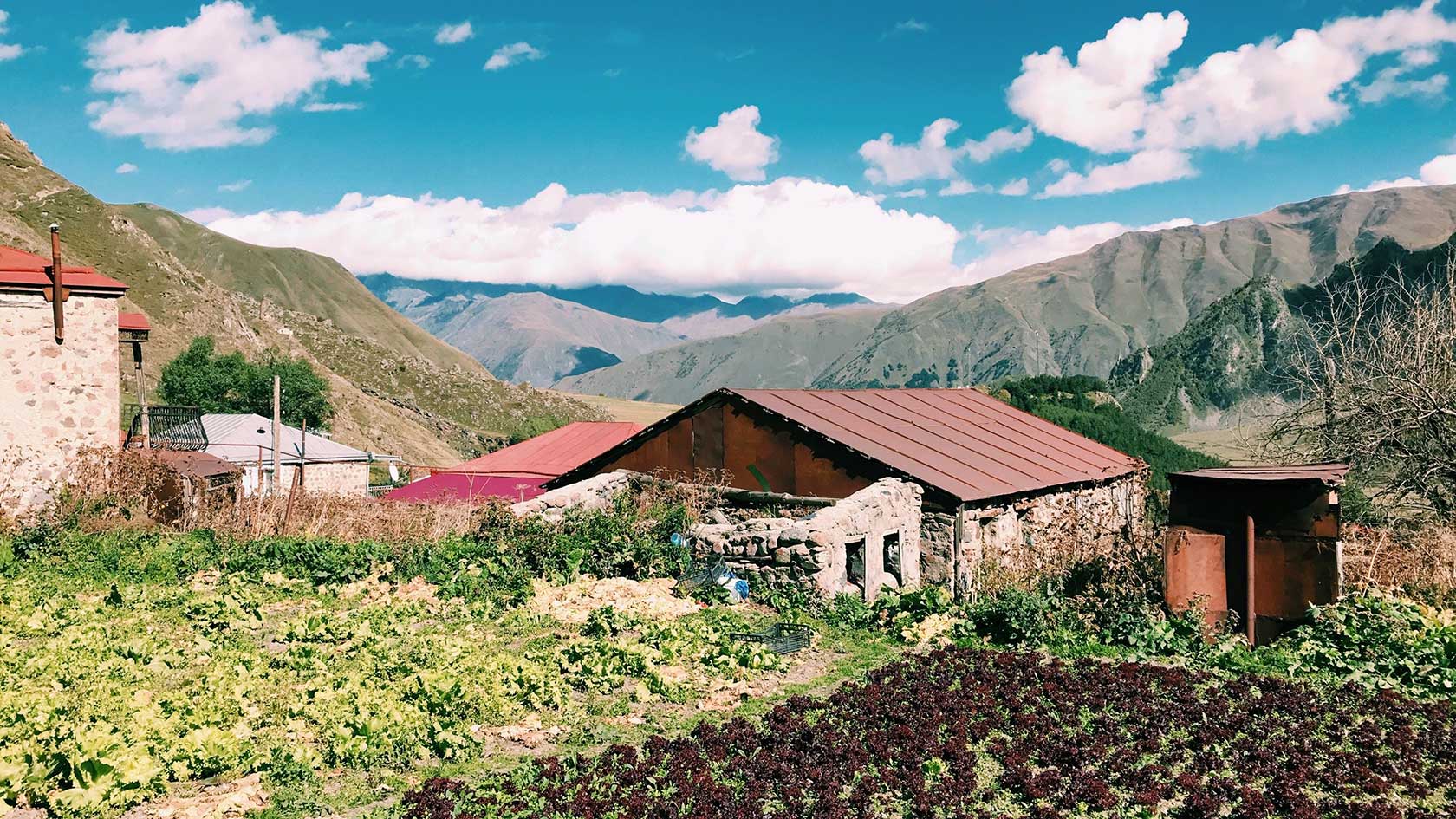Share Your Mountain Landscapes
Gvantsa Salukvadze stands in front of a vast field of lettuce in Khurtisi, a small hamlet in the Caucasus mountains in Georgia. She pulls out her smartphone, takes a picture and adds it to MountainApp (MTA) by dropping a pin on the map. The PhD candidate at Tbilisi State University (TSU) then adds some more information about the spot, describing how lettuce farming, in addition to tourism, helps some families make a living in the remote mountain region. Meanwhile, far away at the University of Zurich, geography student Ella Schubiger opens the very same pin on her phone and adds her own comment. She uploads a picture taken of an observation she made in the Val Lumnezia valley in the Grisons, where infill development has led to the conversion of disused barns into residential homes, without significantly altering the buildings’ historical exterior.
App, blog, hybrid lecture
The MTA app is key part of the Sustainable Mountain Development research seminar, a transnational course jointly offered by UZH and TSU in Georgia. It explores issues and topics that are highly relevant to both the Alps and the Caucasus mountains, including migration, climate change, landscape conservation and regional development. “It’s fascinating that both countries are holding similar discussions despite having very different cultures and geopolitical contexts,” says Annina Michel, who is responsible for the module thanks to her research focus on conservation and landscape planning. “We want to nurture this dialogue and learn from each other.” The dialogue between Zurich and Tbilisi takes place on three levels: through lectures, via a blog and on the MTA app.
In the course’s first iteration, UZH professor Norman Backhaus, Annina Michel and their Georgian counterparts Joseph Salukvadze, Temur Gugushvili and Gvantsa Salukvadze took turns giving lectures on their respective fields. “To keep the focus on both mountain regions, a UZH lecture was always followed by an assessment given by the Georgian members of the team, and vice versa,” explains Annina Michel. The lecture halls in Zurich and Tbilisi were linked through live streaming. “This hybrid format was a pilot project in and of itself, with some patchy internet connection,” says the postdoc, laughing. The wide variety of topics was reflected in the students’ blog posts, which were published on the course website at www.mountainapp.net. To write the blog posts, UZH students were able to team up with individual students from TSU, adding a personal element to the international cooperation.

Like a social network
Another key part of the cross-university dialogue was an app that Annina Michel developed with funding from the UZH Teaching Fund. The app’s interactive map allows students and instructors to share individual observations from their mountain regions and surrounding environment. Over the course of the semester, the students in both countries were given a number of observation tasks, which they had to document in the app. “It was interesting to see how the students in Georgia lived, or where they went on holiday,” says UZH student Ella Schubiger. Her favorite picture in the app shows an abandoned high-rise building on the coast of the Black Sea that is slowly being reclaimed by nature. “The app gave us highly personal impressions of Georgia – very different from what you’d learn from pictures on the internet,” says Alessandro Joshua Pierro, a UZH geography student who took the course. Those using the app can “like”, comment on or ask questions about spots added by other users, like with a social media platform. “We developed the app specifically for this course,” says Annina Michel, “but it’s freely available and could also easily be used for a citizen science project in the future.”
Free to explore
Ella Schubiger’s photo of the barn in Val Lumnezia was taken during a field trip for the project that students had to complete for the course. Together with Pierro and two other students, she investigated how the revised Swiss Spatial Planning Act has affected Vella, a small village in the Grisons mountains. “It was the first time in my Bachelor’s studies that we were free to choose our own research question – that was really cool,” says the geography student. They interviewed two skiing instructors in Vella and found out how the village has been dealing with issues such as building land scarcity, second homes and infill development – complete with town gossip and personal anecdotes. To conclude the course, the students presented their findings to the participants from both countries, with the projects published on the MountainApp website in the spring of 2023.
Promising pilot project
“The Sustainable Mountain Development’s international approach makes it a perfect fit for the subject of geography,” concludes Ella Schubiger. The elaborate teaching format developed by the instructors has managed to broaden the students’ horizons, both on a personal and scientific level. “Thinking in terms of spatial planning, language, geopolitics and ecology at the same time was fascinating,” says Pierro. Annina Michel made a point of personally talking with students to find out how the course could be made even better in its second year. One point mentioned was that direct interactions between UZH and TSU students should be given more weight.
Cooperating with a country unfamiliar to most UZH members was an inspiring and valuable experience, not only for the students but also for Annina Michel herself. “Getting an outside view also gave me a new outlook for my research on the Swiss Alps,” she says. Developing the app and course enabled her to meet many new people, in her own department as well as in Georgia, where she now also works on a research project as an external consultant. Meanwhile, the students are also keen to use the new international network and are already planning a visit to Georgia to see the country’s fascinating spots – outside the app, of course.
